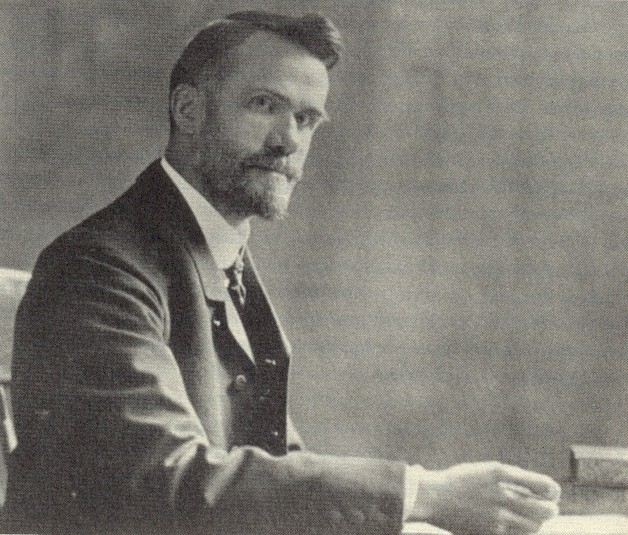
The American theologian and Baptist pastor Walter Rauschenbusch (1861–1918) is most famous for his notion of the “social gospel”. But while emphasizing the partial presence of the Kingdom of God in this life, Rauschenbusch did not ignore matters of soteriology and eschatology. Rather, for Rauschenbusch, the hope in the restorative justice and mercy of the coming Kingdom of God, made it possible to entertain that the love of God could also have the power to change current state of affairs for the better. While rejecting a traditional protestant notion of “hell” as well as the more simplistic forms of universalism, Rauschenbusch instead affirmed an idea of a progressive purgation much like that of fellow Baptist Elhanan Winchester and others before him.
The following are excerpts from the chapter on eschatology in Rauschenbusch’s A Theology for the Social Gospel (1917).
The Christian religion needs a Christian eschatology. To be satisfying to the Christian consciousness any teaching concerning the future life of the individual must express that high valuation of the eternal worth of the soul which we have learned from Christ, and must not contradict or sully the revelation of the justice, love, and forgiving mercy of our heavenly Father contained in his words, his life, and his personality.
[…] we can not rejoice in hell. It can’t be done. At least by Christians. The more Christian Christ has made a soul, the more it would mourn for the lost brothers. The conception of a permanent hell was tolerable only while God was conceived as an autocratic sovereign dealing with his subjects; it becomes intolerable when the Father deals with his children.
To-day many Protestants are allowing the physical fires of hell to go out, and make the pain of hell to consist in the separation from God. They base the continuance of hell, not on the sovereign decree of God but on the progressive power of sin which gradually extinguishes all love of good and therewith all capacity for salvation. But this remains to be proven. Who has ever met a man that had no soft spot of tenderness, no homesick yearning after uprightness left in him? If God has not locked the door of hell from the outside, but men remain in it because they prefer the darkness, then there is bound to be a Christian invasion of hell. All the most Christian souls in heaven would get down there and share the life of the wicked, in the high hope that after all some scintilla of heavenly fire was still smouldering and could be fanned into life. And they would be headed by Him who could not stand it to think of ninety-nine saved and one caught among the thorns.
The idea of two fixed groups does not satisfy any real requirement. Men justly feared the earlier Universalist doctrine that all men enter salvation at death. That took sin lightly and offended the sense of justice. The idea of a scale of life in which each would be as far from God and in as much darkness and narrowness as he deserved, would constitute a grave admonition to every soul. Indeed it would contain more summons to self-discipline than the present idea that as long as a man is saved at all, he is saved completely and escapes all consequences. To-day the belief in hell has weakened in great numbers of people, and in that case there is no element of fear at all to aid men in self-control. The Christian idea would have to combine the just effects of sin for all and the operation of saving mercy on all.
[…]
There are only a few things which we can claim with any assurance, and these are not based on a single prediction, or on some passage, the origin or meaning of which may be disputed, but on the substance of the gospel of Christ. These are : that the love of God will go out forever to his children, and especially to the neediest, drawing them to him and, where necessary, saving them; that personality energized by God is ever growing; that the law of love and solidarity will be even more effective in heaven than on earth; and that salvation, growth, and solidarity are conditioned on interchange of service.
The worth of personality, freedom, growth, love, solidarity, service, — these are marks of the Kingdom of God. In Christ’s thought the Kingdom of God was to come from heaven to earth, so that God’s will would be done on earth as it is in heaven. So then it exists in heaven; it is to be created on earth. All true joys on earth come from partial realizations of the Kingdom of God ; the joy that awaits us will consist in living within the full realization of the Kingdom. Our labour for the Kingdom here will be our preparation for our participation hereafter. The degree in which we have absorbed the laws of the Kingdom into our character will determine our qualification for the life of heaven. If in any respect we have not been saved from the Kingdom of Evil, we shall be aliens and beginners in the Kingdom of God. Thus heaven and earth are to be parts of the same realm. Spiritual influences come to us; spiritual personalities go out from us. When our life is in God it has continuity.
The whole book is available here: Walter Rauschenbusch, A Theology for the Social Gospel (1917).
